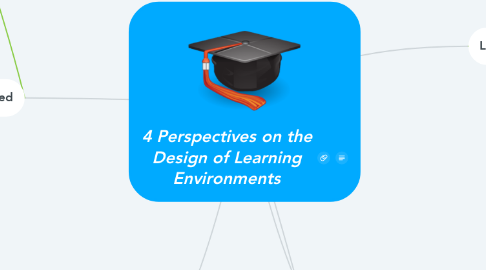
1. Assessment-Centered
1.1. Focus on providing opportunities for feedback and revision.
1.2. Pros
1.2.1. Encourages students to ask questions
1.2.2. Engages students while teaching lessons
1.3. Gives opportunity to correct mistakes made in coursework
1.4. Cons
1.4.1. Questions may interfere with delivering the lesson
1.4.2. Not all children may feel comfortable responding in front of classmates
2. Community-Centered
2.1. Focus on people learning from one another and contributing to the larger societies of people who share common interests and/or goals.
2.2. Pros
2.2.1. Help build up social skills
2.2.2. Children will learn from each other
2.2.3. Students will build a relationship with each other, and be able to relate on a more personal level
2.3. Cons
2.3.1. Students may learn incorrectly from another student
2.3.2. It would be hard for those struggling to get individual time to focus on their issues
3. A Learning Environment is not only a physical location, but is shaped by the type of instruction that needs to occur, and it is influenced by the attitudes and preferences of those who organize and operate that environment.
4. Ex: Having a pop quiz, grading it as a class, and answering any questions students had trouble with
5. Ex: A classroom that has many stations with different activities that a group of students rotate around to.
6. Learner-Centered
6.1. Focus on the attitudes, skills, knowledge, and beliefs that students bring to an instructional setting.
6.2. Pros
6.2.1. Focused on the individual, and the progress made throughout the class
6.2.2. Build skill and a knowledge base to create a firm foundation in which to build upon
6.2.3. A standard set from the beginning, but look to improve and go above while going through class
6.3. Cons
6.3.1. More focused on the individual rather than the class as a whole
6.3.2. Students may not "improve" due to this environment
7. Knowledge-Centered
7.1. Focus on the information and activities that help learners develop an understanding of disciplines.
7.2. Pros
7.2.1. A detailed approach on learning the information
7.2.2. The use of activities that will cultivate the learning process
7.2.3. Help develop a more thorough understanding of the content
7.3. Cons
7.3.1. May be too complex for some students to grasp fully compared to other approaches
7.3.2. Could be too focused on the content, and not the students other skills and abilities

